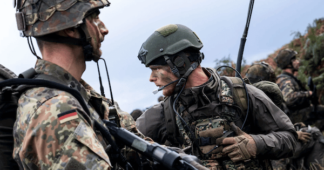Jun 2, 2024
Germany went from doing its best to avoid getting dragged into the Ukraine quagmire to one of the NATO proxy war’s biggest cheerleaders, committing over 10 billion euros in military and economic support to Kiev, and suffering major economic losses due to spiking energy costs after cutting itself off from cheap and plentiful Russian pipeline gas.
Bundestag Defense Committee Chairwoman Marie-Agnes Strack-Zimmermann has urged the government and armed forces to activate 900,000 reservists in light of the so-called Russian threat.
“Putin is preparing his people for war and positioning them against the West. We must therefore become capable of defending ourselves as quickly as possible,” Strack-Zimmermann told the Funke Media Group on Saturday.
“Russia produces only weapons. School books are being printed that portray Germany as an aggressor,” the lawmaker claimed.
Therefore, she recommended, Germany needs to “activate the approximately 900,000 reservists,” first by making them register with the state. “If we could get half [of those with military experience] as reservists, that would be an incredible pool.”
Strack-Zimmermann, whose Free Democratic Party is part of Chancellor Olaf Scholz’s Traffic Light Coalition alongside the Social Democrats and the Greens, has been an avid proponent of a military solution to the Ukraine crisis from its outset, actively promoting the delivery of German heavy armor to Kiev.
Her remarks come just days after Defense Minister Boris Pistorius apparently dropped plans to reintroduce conscription under his campaign to make Germany a “war-ready” nation, and promised a new, “largely voluntary” recruitment scheme after months of internal debate in the government over the severely unpopular proposal ahead of upcoming elections for the European Parliament later this month.
The new government proposal does not mention “compulsory military service,” but could force Germans over 18 years old to fill out a physical fitness assessment questionnaire for reference. Other proposals include the waiver of administrative fees for driver’s licenses, discounts on student loan repayments, and other enticements.
The Bundeswehr has experienced a years-long slump in its recruitment numbers, with troop numbers shrinking (by 1,500 personnel to 181,500 total in 2023) despite plans to grow its ranks to at least 203,000 personnel by the early 2030s.
Germany indefinitely suspended conscription in 2011.
To deal with the dearth in recruitment and the political unpopularity of conscription, German Reservist Association Chairman Patrick Sensburg recently called on the military to systematically record the health status and availability of all former military personnel in order to create plans for their deployment for homeland security and national and alliance defense in case of a crisis. Germany counts “reservists” as all former military service members of the Bundeswehr, but does not count troops from the defunct National People’s Army of the German Democratic Republic – the pro-Soviet East Germany annexed by the Federal Republic in 1990 with Mikhail Gorbachev’s blessing on the condition that NATO does not expand the alliance to the east. Veterans of the defunct National People’s Army number in the hundreds of thousands, and faced widespread dismissal in the 1990s, miserly pension benefits, and difficulties finding work in the new Germany.
Berlin has allocated some 10 billion euros ($10.85 billion US) in military aid to Ukraine over the past two years, more than any other country in NATO besides the United States. This support has included an array of heavy weapons – from tanks and armored vehicles to air defense batteries and artillery, with Leopard 1s and 2s making up the backbone of Ukraine’s NATO main battle tanks, and destroyed by the dozens by Russia during last year’s Ukrainian counteroffensive.
Berlin joined lockstep with Washington on Friday by formally greenlighting Ukrainian strikes against targets deep inside Russia using long-range NATO strike systems, but has yet to deliver its Taurus missiles, which have a range of up to 500 km.
At home, German generals and politicians have complained of major problems with the Bundeswehr’s capabilities, including the inability to scrape together even a single 20,000-troop-strong combat-ready division after sending billions in equipment to Ukraine, and controversial plans to send “panzer battalions without panzers” to guard NATO’s eastern flanks in light of the Russian threat.”
Russian officials including President Vladimir Putin have said repeatedly that Moscow has no interest – “neither geopolitical, nor economic, nor political, nor military” – in getting into a conflict with NATO, while warning of the dangers of the Ukraine proxy war’s potential for escalation.
At the same time as Germany has ramped up defense spending and sought to increase the size and strength of its military, the country has suffered major economic difficulties throughout the course of the Ukraine crisis. Hundreds of major companies have relocated industrial production overseas amid unbearably high energy prices after the German government unilaterally rejected pipeline gas deliveries from Russia, and after US Navy divers allegedly destroyed the Nord Stream pipeline network. The traditional European industrial powerhouse’s recession has dipped in and out of recession, with Economy Minister Robert Habeck admitting in February that the country’s economy was in “troubled waters” and performing “dramatically bad.”
We remind our readers that publication of articles on our site does not mean that we agree with what is written. Our policy is to publish anything which we consider of interest, so as to assist our readers in forming their opinions. Sometimes we even publish articles with which we totally disagree, since we believe it is important for our readers to be informed on as wide a spectrum of views as possible.











